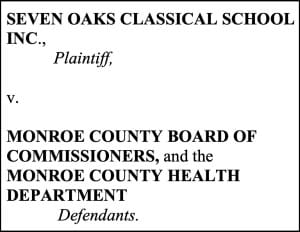School files lawsuit against Monroe County over pandemic mask mandate citation

Seven Oaks Classical School is again challenging its citation for violation of the county’s indoor mask mandate, which is connected to the COVID-19 pandemic.

This time the challenge comes in papers filed with the Monroe County circuit court.
The county has enacted a mask regulation to help prevent the spread of the COVID-19 virus. In August, the school was cited by the county for violation of the mask mandate and fined $250.
After hearing the school’s appeal, commissioners upheld the citation, but waived the fine.
In the action now filed with the circuit court, Seven Oaks is challenging the denial of its appeal.
The court challenge is based on three separate allegations, one of them that Monroe County commissioners violated Indiana’s Open Door Law.
One of the questions raised by the complaint is whether the commissioners were acting in their capacity as a judicial body and how that impacts the application of the Open Door Law.
As a factual matter, the commissioners held a hearing of the school’s appeal on a Monday, and rendered a decision three days later, on a Thursday. Between that Monday and Thursday, the lawsuit contends, commissioners deliberated and reached a decision on the school’s appeal, without giving any public notice of their deliberations as required by Indiana’s Open Door Law.
The commissioners have acknowledged their deliberation and decision making outside of a public meeting. But they argue that the judicial nature of the proceeding excludes it from the Open Door Law.
That acknowledgment and defense by the commissioners is already known, because Seven Oaks filed a complaint with the state’s public access counselor (PAC), and the commissioners have responded to it. The public access counselor has not yet rendered an opinion on the complaint.
Here’s what the county said in response to the PAC complaint:
Seven Oaks contends that the “circumstances give rise to the inference the deliberation took place outside the public eye. …” This is correct. The Commissioners did deliberate and decide the issues presented on appeal outside of a public meeting.
Seven Oaks describes that statement as the commissioners having “conceded” that they deliberated and decided issues outside a public meeting.
But the county argues in its response to the PAC complaint along the lines that it will likely argue in the circuit court—that the county board of commissioners was acting in a judicial capacity and thereby not subject in that action to the Open Door Law. From the county’s response:
In this context – the exercise of a judicial function—deliberation outside of a public meeting does not violate the requirements of the ODL. In such matters, the Commissioners—as a quasi-judicial body—have inherent authority to deliberate judicial matters outside of a public meeting before issuing a timely, written decision. In this case, the Commissioners did not violate the requirements of the ODL in the review, hearing, and deliberation of the matters presented by Seven Oaks in its appeal of the Health Department’s enforcement action.
Once PAC’s opinion is issued, the court is not required to follow it. But PAC’s analysis will likely be given significant weight by the court.
Two other causes of action, besides the allegation of an Open Door Law violation, are included in the Seven Oaks complaint filed this week.
A second allegation described in the complaint is that the commissioners did not apply the appropriate standard of review outlined in the county ordinance under which the appeal was heard, which is MCC 307-5.
The ordinance lists three points under the standard of review:
The Commissioners shall review each appeal to determine if implementation of the order causes harm due to any one of the following:
1. Enforcing the health order would have an inverse [sic] impact to individuals experiencing a disability,
2. The appellant has a compelling interest that justifies deviation from the health order and have taken measurers [sic] that insures [sic] public health; or,
3. Appellant appeals that no violation of the emergency health order occurred.
The lawsuit alleges that the written opinion issued by commissioners portrayed the school’s arguments in a way that did not accurately depict the school’s actual basis of appeal.
The written opinion of the commissioners says that the school’s basis of appeal was as follows:
1. That enforcing the citation would have impact on students experiencing disability and that those impacts outweigh the risks contemplated by the Emergency Health Order.
2. That enforcing the citation would materially impact a compelling interest that justifies deviation from the Emergency Health order and that the School has taken measures that ensures the public health.
3. The Emergency Health Order does not apply to Seven Oaks Classical Schools, Inc.
The lawsuit contends that “The Appeal Decision should be declared void because the Commissioners misstated the basis for the Plaintiff’s Appeal and misapplied the standard of review required when rendering an appeal decision.”
As the third point of the lawsuit, Seven Oaks asks the court to review, under a general statute on the government of counties, the decision of the commissioners to deny the school’s appeal of the mask mandate citation.
Under state law, “a party to a proceeding before the executive who is aggrieved by a decision of the executive may appeal that decision to the circuit court, superior court, or probate court for the county.” The three commissioners are the executive branch of the county government.
Seven Oaks is represented in the lawsuit by Bloomington attorney Carl Lamb.




Comments ()